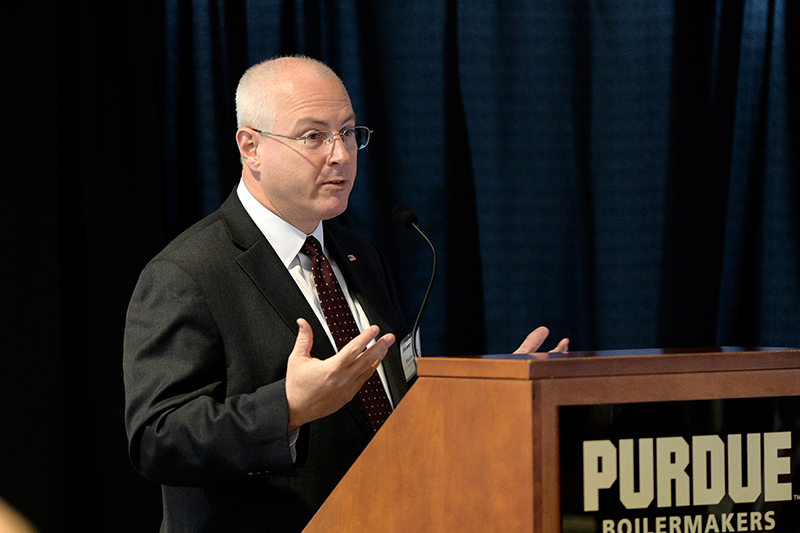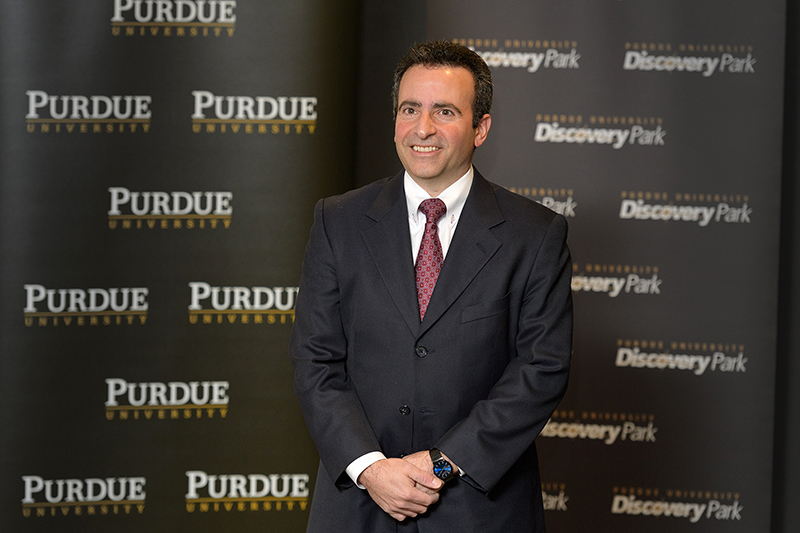December 1, 2016
Global defense and security institute launched at Purdue
 The U.S. Department of Defense is always on the lookout for innovation and is a tremendous customer of research universities, says Assistant Secretary of Defense for Research and Engineering Stephen P. Welby, who spoke at Purdue University on Thursday (Dec. 1). Welby says the military is increasingly looking to university researchers to help shape the future of the nation’s defense. (Purdue University photo by John Underwood)
Download image
The U.S. Department of Defense is always on the lookout for innovation and is a tremendous customer of research universities, says Assistant Secretary of Defense for Research and Engineering Stephen P. Welby, who spoke at Purdue University on Thursday (Dec. 1). Welby says the military is increasingly looking to university researchers to help shape the future of the nation’s defense. (Purdue University photo by John Underwood)
Download image
WEST LAFAYETTE, Ind. - Purdue President Mitch Daniels announced Thursday (Dec. 1) that the university is opening a new Institute for Global Security and Defense Innovation in Discovery Park.
"We live in a dangerous world in which we must continuously invent more, discover more, and innovate more than those who oppose us, and be able to deliver those technologies quickly into the hands of the people who use them to protect the rest of us," Daniels said. "Purdue is well-positioned to do this. We are accomplished at not only discoveries in science, engineering and technology, but delivering those discoveries to the market quickly. We think we can do the same for national security and defense."
As the world deals with changes brought about by emerging technologies such as robotics, rapid manufacturing, autonomous vehicles, artificial intelligence, and at the same time struggles with cybersecurity and biosecurity, the nation's defense and security agencies are perhaps moving even faster to understand what these new technologies will mean in the future.
The Purdue institute was announced during a daylong symposium on global defense issues on the Purdue campus. Dan DeLaurentis, Purdue professor of aeronautics and astronautics and President's Fellow for Defense Initiatives, will be the interim director of the new institute.
 Dan DeLaurentis, Purdue professor of aeronautics and astronautics and President’s Fellow for Defense Initiatives, has been named the inaugural interim director of the new Institute for Global Security and Defense Innovation in Discovery Park. DeLaurentis says with today’s technologies global threats are arising and changing so rapidly new methods of developing defenses and security techniques are also needed, and that will be the focus of the new Purdue institute. (Purdue University photo by John Underwood)
Download image
Dan DeLaurentis, Purdue professor of aeronautics and astronautics and President’s Fellow for Defense Initiatives, has been named the inaugural interim director of the new Institute for Global Security and Defense Innovation in Discovery Park. DeLaurentis says with today’s technologies global threats are arising and changing so rapidly new methods of developing defenses and security techniques are also needed, and that will be the focus of the new Purdue institute. (Purdue University photo by John Underwood)
Download image
The institute will work with Purdue's other research centers and institutes to research areas such as advanced instrumentation, nanotechnology, social and behavioral sciences, big data analytics, and simulations to deliver integrated systems solutions to the nation's security and defense community.
In the 2016 fiscal year, Purdue was awarded more than $50 million for advanced defense-related research projects. The new institute will centralize defense and security research efforts across campus, and, it is hoped, will make Purdue the pre-eminent university in national defense and security.
"Our nation's universities and their research capabilities are the envy of the world, and for good reason," Daniels said. "We should use this competitive advantage, along with government laboratories, private-sector corporations and venture capital firms to ensure continuous technological military superiority."
DeLaurentis said not all discoveries will be from bench science or engineering – behavioral and social science will be equally important.
"We must develop teams that can understand and then address threats in a manner that integrates technical, social and policy factors," he said. "These issues must be confronted holistically when we develop pathways to greater security."
Tomás Díaz de la Rubia, chief scientist and executive director of Purdue's Discovery Park, said that the United States has gained a technological advantage, or "offset," in each of the past major conflicts. Nuclear weapons, stealth technologies, global positioning and accuracy are all examples of the ways the U.S. has stayed ahead of its adversaries. But to stay ahead now, the U.S. should be in a state of continuous development, or continuous offset, he said.
"We can no longer rely on decades of military superiority via so-called technology 'off-sets.' Countries around the world are innovating and advancing, whether it is quantum computing, cryptography, or hypersonic weapons, or artificial intelligence, the gap is closing fast," he said. "In the future we must out-invent, out-discover, and out-innovate our adversaries every day."
More information about the Purdue Institute for Global Security and Defense Innovation can found on the website.
Additional quotes about Purdue's new Institute for Global Security and Defense Innovation:
Eric Holcomb, Indiana Lieutenant Governor and Governor-elect:
"Leaders from around the world continue to look to Purdue University to help find solutions for some of our most complex security and defense issues. This year's Global Defense Symposium is another way for Purdue to set the course by exploring the evolving global security landscape. Our nation's research universities will be vital components of our defense strategy, helping to develop many of the innovative technologies that will keep our nation safe."
Jim Schellinger, president of the Indiana Economic Development Corp.:
"Hoosiers across Indiana are pioneering new technologies in defense and cybersecurity, playing a key role in keeping the world safe. Since 2002, defense contracts have doubled in Indiana, creating thousands of high-paying, quality Hoosier jobs. Indiana's world-class research institutions like Purdue University are crucial in the development of this sector, working in partnership with industry leaders to help them develop innovative new technologies. Today, Purdue is helping train the next generation of engineers and technology experts, and with the launch of its new Institute for Global Security and Defense, we'll soon see more Purdue graduates ready to fill these great new jobs coming to our state."
Capt. Jeffrey "JT" Elder, Commanding Officer, Naval Surface Warfare Center, Crane Division (NSWC Crane)
"We are pleased that Purdue University has decided to create the Institute for Global Security and Defense Innovation. At the Naval Surface Warfare Center, Crane Division (NSWC Crane), we proudly provide American warfighters with innovative solutions to their toughest technical challenges. Our efforts at innovation will benefit greatly from being in close proximity to this new high-tech, research and development institute, and Purdue University and NSWC Crane will have a chance to further build on our collaborative relationship. Additionally, the creation of this institute will provide benefit to NSWC Crane through the education and training of a highly-skilled technical workforce to meet our growing demand for scientists and engineers."
Suresh Garimella, Purdue's executive vice president for research and partnerships and the Goodson Distinguished Professor of Mechanical Engineering:
"Purdue University is deeply committed to contributing to our nation's security and defense innovation. Partnerships and alliances with federal agencies, national laboratories, and companies engaged in defense-related innovations are a strategic share of our research portfolio as we arrive at solutions to the global security challenge."
Writer: Steve Tally, 765-494-9809, steve@purdue.edu
Sources: Dan DeLaurentis, 765-494-0694, ddelaure@purdue.edu
Tomás Díaz de la Rubia, 765-496-6625, tddlr@purdue.edu

